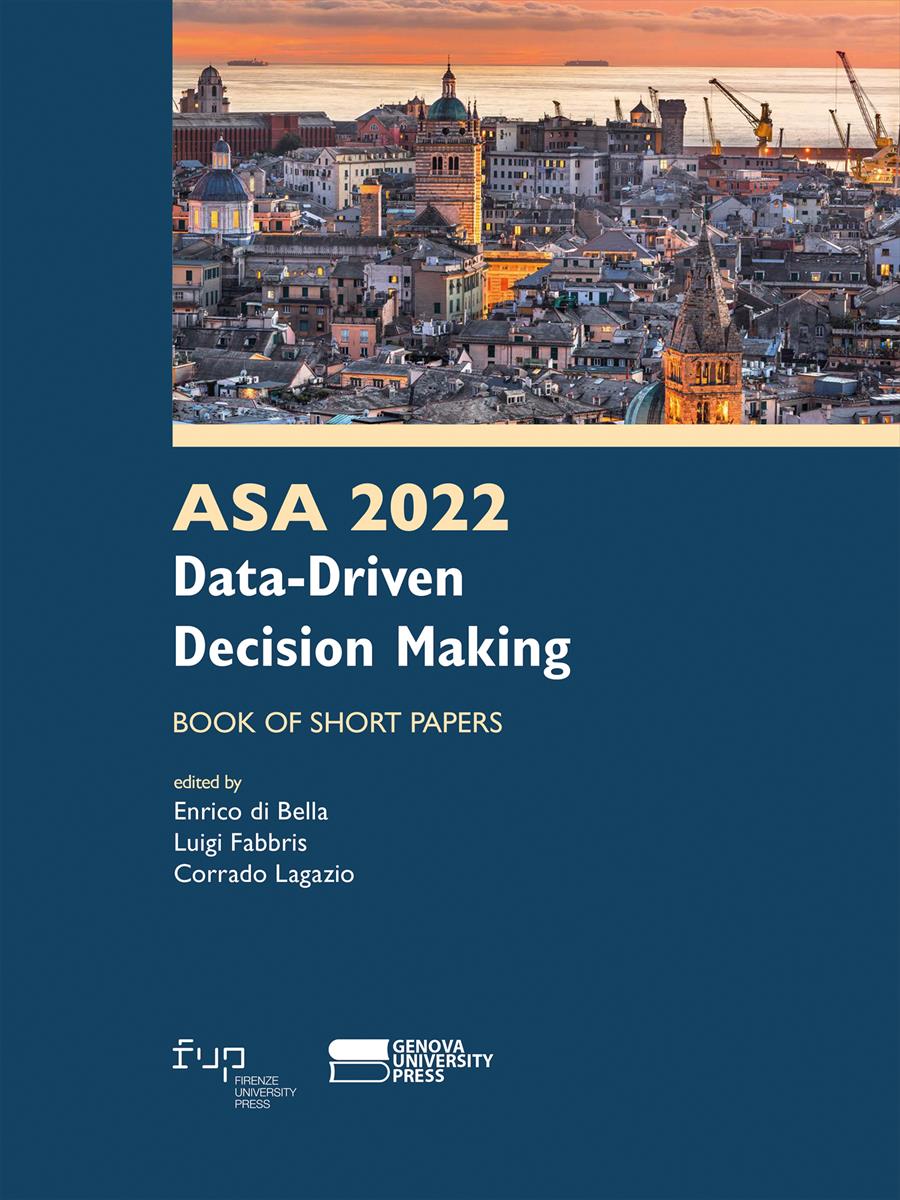- ASA 2022 Data-Driven Decision Making
- A cura di Enrico di Bella, Luigi Fabbris, Corrado Lagazio
Gender INequality Indicator for Academia (GINIA)
- Margherita Silan
- Giovanna Boccuzzo
- © 2023 Author(s) |
- CC BY 4.0
- DOI: 10.36253/979-12-215-0106-3.54
The main aim of this work consists on a methodological proposal to represent and measure gender inequality in academia, focusing on the University of Padua. In order to reach our goal, we ended up with two different and complementary tools: a system of indicators and a composite indicator, that we called Gender INequality Indicator for Academia (GINIA). Data used to build and compute GINIA in the University of Padua come both from administrative datasets and from an ad-hoc survey, whose data were adjusted by post-stratification weights. Starting from existing indexes described in the literature, the GINIA is articulated into seven domains: work, money, knowledge, time, power, health, and space. These seven domains are better specified and declined through twelve subdomains that are measured by seventeen variables. The composite indicator is the result of the three-step aggregation and weighting procedure: 1) variables are aggregated into subdomains with an arithmetic mean and equal weights; 2) subdomains are aggregated into domains by arithmetic mean with equal weights; 3) domains are aggregated into GINIA indicator by a weighted geometric mean. Indeed, we think that variables related to the same domain can compensate each other, while this consideration is not plausible for domains. Additionally, the weights in the last step are calculated through a preference matrix based on the responses of the respondents about the importance they give to each domain. The indicator can change substantially if we change the methods of weighting or aggregation. Therefore, an uncertainty and sensitivity analysis was undertaken to assess the robustness of the composite indicator as the final step of the analysis with the computation of bootstrap confidence intervals.
- Keywords:
- Gender equality,
- Composite indicator,
- Sensitivity analysis,
University of Padua, Italy - ORCID: 0000-0001-5541-0603
University of Padua, Italy - ORCID: 0000-0003-2143-7730
- European Commission, Directorate-General for Employment, Social Affairs and Inclusion (2019). Manual for gender mainstreaming : employment, social inclusion and social protection policies, Publications Office. DOI: 10.2767/19842
- Barbieri, D., Cazorla, A. G., THIL, L., Mollard, B., Ochmann, J., Peciukonis, V. (2021). Gender Equality Index 2021: Health. DOI: 10.2839/035225
- Boccuzzo, G., Rocco, I., Silan, M., Badaloni, S. (2016). Methodology of the System of Indicators, in A model for building a Gender Equality Index for academic institutions, eds. S. Badaloni and L. Perini, Padova University Press, pp. 59–79.
- GENIS LAB (2011). The Gender in Science and Technology LAB ? GENIS LAB. https://cordis.europa.eu/project/id/266636, last access: 20th November, 2022.
- Gender Time (2012). Transfering Implementing Monitoring Equality Gender Time. https://gendertime.org/, last access: 20th November, 2022.
Informazioni sul capitolo
Titolo del capitolo
Gender INequality Indicator for Academia (GINIA)
Autori
Margherita Silan, Giovanna Boccuzzo
Lingua
English
DOI
10.36253/979-12-215-0106-3.54
Opera sottoposta a peer review
Anno di pubblicazione
2023
Copyright
© 2023 Author(s)
Licenza d'uso
Licenza dei metadati
Informazioni bibliografiche
Titolo del libro
ASA 2022 Data-Driven Decision Making
Sottotitolo del libro
Book of short papers
Curatori
Enrico di Bella, Luigi Fabbris, Corrado Lagazio
Opera sottoposta a peer review
Anno di pubblicazione
2023
Copyright
© 2023 Author(s)
Licenza d'uso
Licenza dei metadati
Editore
Firenze University Press, Genova University Press
DOI
10.36253/979-12-215-0106-3
eISBN (pdf)
979-12-215-0106-3
eISBN (xml)
979-12-215-0107-0
Collana
Proceedings e report
ISSN della collana
2704-601X
e-ISSN della collana
2704-5846
